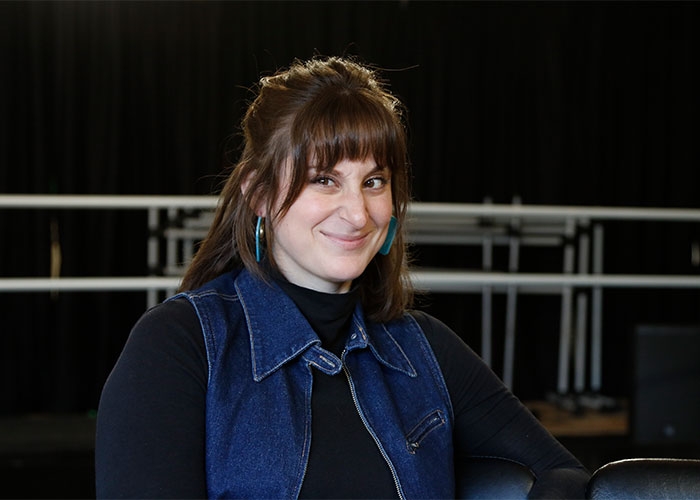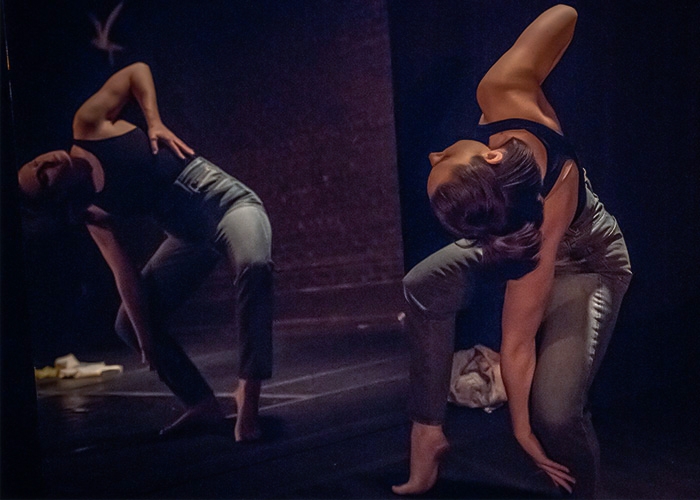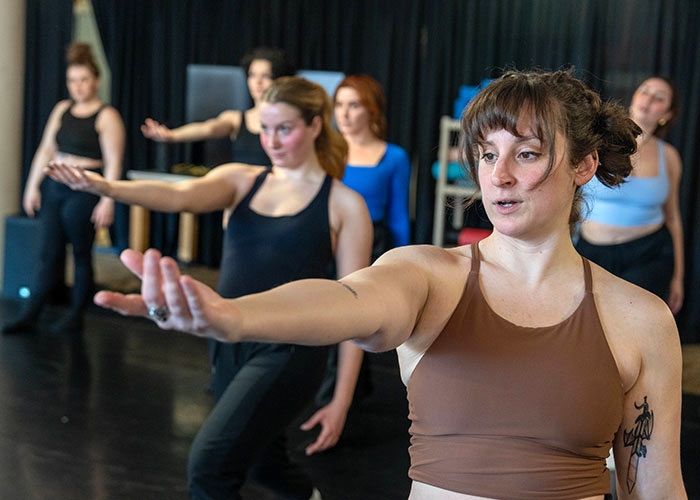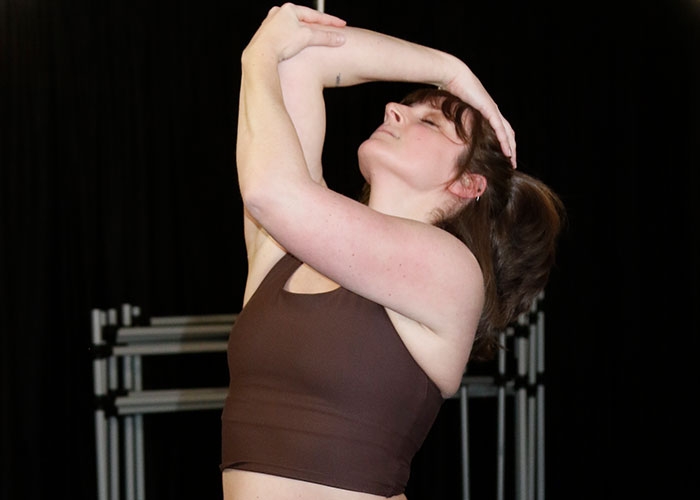
“Come in. Dance with us.” – Alicia Wilder, dance major and founder of her own dance company
Walk into her dance studio and you’ll find that Alicia Wilder has got a special kind of magic that zaps you unawares. It doesn’t matter if you’re 16 or 60. You’ll find yourself moon-walking your way back home, feeling like a kid again.
Wilder is founder, artistic director and lead choreographer of Metamorphosis: The TEN31 Productions Dance Company, and she’s bringing renewed life to the Rhode Island community through dance.
TEN31, founded by RIC alumni Joe Pari ’94 and Eric Auger ’92, specializes in immersive living art performances.
Initially, Pari and Auger brought Wilder in as one of the living statue performers. She had just earned her degree in dance performance with a minor in theatre at RIC in 2010.

As Wilder got more involved with the productions, assisting behind the scenes, the owners asked her what she’d like to bring to TEN31 that was uniquely her own.
Her eyes lit up. “Dance. I’d like to incorporate dance into the productions,” she said. Thus, Metamorphosis was born.
In this Q&A, Wilder reflects on how she is living her dream and helping to midwife the dreams of others.
You were a dance performance major at RIC. Why did you choose dance?
I actually started out as a technical theatre major. I was afraid to major in dance because I thought there wouldn’t be any jobs. Technical theatre seemed safer. But during my first semester, I auditioned for the RIC Dance Company and got in. When I started working with the company, I said, “Nope. This is what I want to do with my life.” And I changed my major to dance performance.
Creating community through dance is important to you. Why?
Growing up I often felt like the “Other,” like people were saying, “Man, that’s a quirky human.” I loved to sing show tunes. I loved to wear eccentric outfits. I wasn’t afraid to just bust out into a dance move in the middle of the grocery store. I still do.
I had friends who would say to me, “Alicia, you’re embarrassing us” or “Alicia, calm it down.” So, where do people like me find our people? I found mine in dance and theatre spaces. Being at Rhode Island College was the first place where I met people who fully embraced who I was. They embraced me completely.

I remember being at freshman orientation. Another kid and I were sitting and talking and I used the word “nifty.” He goes, “Did you just say, ‘That’s nifty’?” Immediately my whole soul was like, “Oh, no, this person is going to make fun of me for saying the word nifty.” Instead, he said, “That’s awesome. I love that.”
One of the things I found most valuable about my time at Rhode Island College was the community, the support of that community and the friendships I made. RIC was the first place where I found people who were like me – who were eccentric and wanted to just explore everything, who wanted to perform in their dorm rooms for their friends, who wanted to make silly videos, who wanted to dance in the street. I found myself when I was at Rhode Island College. I also found my husband [Justin Wilder ’09].
Many current students and alumni from RIC’s dance program have become members of your company. Why have you hired so many RIC dancers?
The dancers who come out of RIC are really well-trained, they understand how to hold themselves in an audition, they know how to hold themselves in a class setting, they know how to work collaboratively with other dancers and they always seem to have a sense of joy in what they’re doing, which is so important to the work that we do here and why I like connecting them to our company after they graduate.

I also think that a lot of dancers who go to RIC have the desire to stay in Rhode Island. I think it’s important to make sure those students know that there are opportunities for them to work in the world of dance right here in their backyard.
Your dance company has also opened its studio to the greater Rhode Island community. What do you offer?
We offer modern dance, ballet, different forms of jazz. We’ll occasionally bring in instructors to do hip hop classes or salsa classes. I personally teach Broadway jazz and contemporary dance classes. I also teach fitness classes, which are based in cross training and strength training. These classes help prepare our bodies for dance.

And these classes are open to everyone?
We welcome people from all walks of life, all dance experience levels. In so many aspects of my life, dance and theatre spaces were the spaces where I felt welcomed. So, what’s very important to me is that our space, our classes, our community does that for anyone who walks through the door. It gives me the opportunity to give back. I want to make sure that as many people as possible can access that community, that safe space, find that part of themselves that desires self-expression. Come in. Dance with us.

On average, a dancer’s performance career can be quite short, rarely lasting beyond the age of 35. This is due to the physically demanding nature of the work. You’re 36 years old and recently had an injury requiring surgery. How were you able to come back from that?
I tore my labrum in my right hip. It got to a point where I couldn’t walk without being in pain. I needed to have surgery in order to continue my career. A couple of doctors said to me, “Why do this surgery? A dancer’s career is usually over at age 35 anyway.”
I decided I wanted to have the surgery because I wasn’t content with the idea that my career would be ending. I needed to continue to do the thing that I love. It was definitely a long and difficult recovery process – about a year and a half – but what got me through was knowing that dance is what feeds my soul. If I don’t have that in my life, I feel incomplete.

Most professional dancers in their mid-30s transition to other roles within the dance industry. Some become choreographers, teachers, dance administrators. Others go into careers in wellness, dance therapy or fitness instruction. You seem to have done it all while continuing to dance professionally.
There’s an older dancer in our community named Chloe Carlson who is an inspiration to me. She’s in her late 60s and she’s still going strong, she’s still choreographing, teaching and performing. I met her many years ago at Elm City Dance Collective. She was my duet partner. Seeing her still dancing past that point where people say your career is over was an inspiration to me. The fact that she is still able to push through, modify when need be, but make dance a part of her life well into her 60s is a beacon of hope.
How do you feel about your career overall?
I am so happy with where I am and I’m so proud of what I’ve done. The idea of running my own dance company and having a community that I’m surrounded by every day that lifts me up to make me feel stronger and more confident in what I’m doing is more than I could have hoped for. I wake up every day and think, “I get to go to this space and be with people that I love and spread joy and make art.” I don’t think I could be happier.
This interview has been edited and condensed.
Learn more about RIC’s B.A. in dance performance program.
Also see “The Magic of TEN31.”
